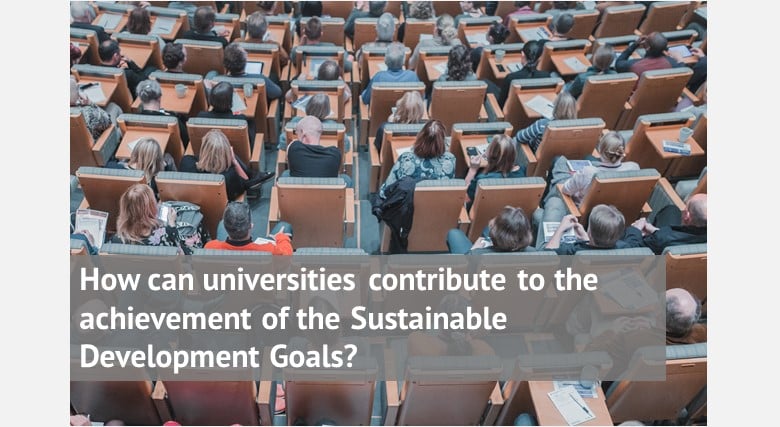The United Nations’ Transforming Our World: The 2030 Agenda for Sustainable Development, was adopted in 2015, with the 17 Sustainable Development Goals (SDGs) as the cornerstone of this most important global agreement in the recent history. The achievement of the Sustainable Development Goals (SDGs) depends on the action taken by all stakeholders- from governments, businesses, civil society to individuals. Even though the importance of all stakeholders is crucial for the implementation and realization of the Agenda, the higher education institutions as knowledge producers can influence and “empower people to change the way they think and work towards a sustainable future”. Well, there is a question how universities can contribute to the realization of the SDGs and what they can gain from it.
How universities can contribute to the SDGs?
The Australia, New Zealand & Pacific Network of the Sustainable Development Solutions Network (SDSN) in collaboration with the Australasian Campuses Towards Sustainability (ACTS) and the global SDSN Secretariat have produced a guide for universities, higher education institutions, and the academic sector titled Getting started with the SDGs in universities. Its aim is to provide practical guidance to universities on how to contribute to the achievement of the SDGs. The role of universities and higher education institutions is critical in the achievement of the SDG agenda through the provision of the knowledge and solutions to underpin the implementation of the SDGs, creation of current and future SDG implementers, enforcement of the principles of the SDGs within their own governance, operations and culture, and provision of cross-sectoral leadership in implementation. This contribution can be divided into four sections:
- Education: providing students with the knowledge, skills, and motivation to understand and address the challenges of the SDGs; empowering and mobilising young people; providing in-depth academic or vocational training to implement SDG solutions; enhancing opportunities for capacity building of students and professionals from developing countries to address challenges relating to the SDGs.
- Research: Encouraging and promoting the SDGs as a topic of research within the university; supporting the full spectrum of research approaches needed to address the SDGs, including interdisciplinary and transdisciplinary research; supporting and incubating innovation for sustainable development solutions; actively supporting national and local implementation of the SDGs; advocating for national support and coordination of research on the SDGs.
- Operations & Governance: aligning university governance structures and operational policies with the aims of the SDGs
- External leadership: strengthening public engagement and participation in addressing the SDGs; initiating and facilitating cross-sectoral dialogue and action on SDG implementation; playing a lead role in policy development and advocacy for sustainable development; demonstrating the importance of the university sector in SDG implementation.
To support the role in Sustainable Development, the UN announced partnerships with 17 universities around the world, which will serve as centers to promote scholarship and best practices around each of the 17 SDGs.
How universities make a difference
The SDGs Agenda cannot be achieved without competent and credible leaders who will drive the agenda forward especially in the corporate world. Thus, business and management schools as well as other management-related higher education institutions have an enormous and profound influence in shaping the mindsets and skills of future leaders.
On this account, many universities globally have adapted their curriculum; they have introduced new degrees, both undergraduate and postgraduate on Sustainability, or new courses that discuss the role of the Sustainability and the SDGs and their practical implementation. Moreover, universities, and in particular business and management related higher education institutions have founded Centres of Excellence for Sustainable Development to promote the concept of Sustainable Development and encourage further learning, partnerships and research. In addition, inviting guest lecturers from the business world to convey practical experience on the application of Sustainability principles in the field and share their experience has become common. Aglaia Ntili, Managing Director of Sustainability Knowledge Group, has been invited as a guest lecture to many universities including Modul University, Canadian University of Dubai and the American University of Sharjah, to share her knowledge and experience on the way business work to adopt the SDGs.
A great initiative to help all universities and higher education institutions to take part in the implementation of SDG agenda is “The Principles for Responsible Management Education (PRME)”, a platform founded to raise the profile of sustainability in schools around the world, and to equip today’s business students with the understanding and ability to deliver change tomorrow’’. Currently, there are over 650 signatories worldwide which are committed to ’’expand their engagement with peers and partners, with the purpose of scaling up accomplishments in the areas of sustainability and responsible management education’’. Murdoch University, with which Sustainability Knowledge Group cooperates with in Dubai, is an advanced signatory of the PRME.
The invaluable role of higher education institutions
The SDGs agenda aims to tackle the world’s most pressing challenges like poverty, economic prosperity, inequality, social inclusion, environmental sustainability and peace and good governance by 2030. The knowledge and expertise that higher education institutions can offer are essential tools for pushing the Agenda forward. After all, knowledge has always been a driver of human evolution and progress and it has led to actions that changed the world we live in. This time, when the world is united in the mission to create a sustainable future, theoretical as well as practical knowledge and critical thinking are more important than ever.
Photo by Mikael Kristenson on Unsplash

